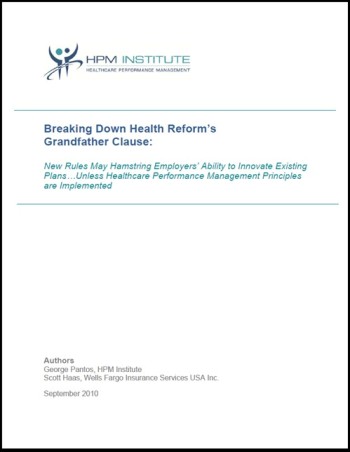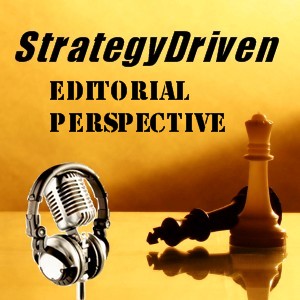Breaking Down Health Reform’s Grandfather Clause

The grandfather clause is a provision in the Patient Protection and Affordable Care Act that seeks to keep a key promise made by the Obama administration: “If you like your health care plan, you can keep your health care plan.” But interim final rules handed down by the Department of Health and Human Services (HHS) and other federal agencies June 17, 2010, appear likely to frustrate the intent of the law and hamstring employers’ ability to offer the best coverage options in a cost-effective manner. In adopting an overly restrictive interpretation of the grandfather clause, the rules essentially diminish employer flexibility to make plan design changes by tying allowable changes to current plan structures.
A new report by the Healthcare Performance Management Institute examines the grandfather clause, the new HHS rules that will govern its implementation and the likely impact on employer health plans. The report also addresses factors organizations should consider when deciding whether or not the benefit of retaining grandfather status outweighs making certain plan design changes.
Click here to download a complimentary copy of this Healthcare Performance Management Institute report.
Want to learn more?
Listen to our recent StrategyDriven Editorial Perspective podcast interview with George Pantos, Executive Director of the Healthcare Performance Management Institute during which we discuss how companies can keep their current health plans in light of the recently passed healthcare legislation and under what circumstances they may wish to do so.
Podcast: Play in new window | Download (Duration: 19:57 — 27.4MB)
Subscribe: RSS

 StrategyDriven Podcasts focus on the tools and techniques executives and managers can use to improve their organization’s alignment and accountability to ultimately achieve superior results. These podcasts elaborate on the best practice and warning flag articles on the StrategyDriven website.
StrategyDriven Podcasts focus on the tools and techniques executives and managers can use to improve their organization’s alignment and accountability to ultimately achieve superior results. These podcasts elaborate on the best practice and warning flag articles on the StrategyDriven website.
 Rick Maurer, author of
Rick Maurer, author of  Since his first Grateful Dead show when he was a teenager in 1979, David Meerman Scott has seen the band perform over 40 times. David is a marketing strategist and a professional speaker. He is the author of the BusinessWeek bestselling book The New Rules of Marketing & PR and several other books. He speaks at conferences and corporate events around the world. He loves to surf (but isn’t very good at it), collects artifacts from the Apollo moon program, and maintains a database, with 308 entries at this writing, of every band he has seen in concert. He is a graduate of Kenyon College, where he listened to a heck of a lot of Grateful Dead in his dorm room.
Since his first Grateful Dead show when he was a teenager in 1979, David Meerman Scott has seen the band perform over 40 times. David is a marketing strategist and a professional speaker. He is the author of the BusinessWeek bestselling book The New Rules of Marketing & PR and several other books. He speaks at conferences and corporate events around the world. He loves to surf (but isn’t very good at it), collects artifacts from the Apollo moon program, and maintains a database, with 308 entries at this writing, of every band he has seen in concert. He is a graduate of Kenyon College, where he listened to a heck of a lot of Grateful Dead in his dorm room. Brian Halligan has seen the Grateful Dead perform more than 100 times. He is CEO & founder of HubSpot, a marketing software company that helps businesses transform the way they market products by “getting found” on the Internet. Brian is also coauthor of Inbound Marketing: Get Found Using Google, Social Media, and Blogs and is an Entrepreneur-In-Residence at MIT. In his spare time, he sits on a few boards of directors, follows his beloved Red Sox, goes to the gym, and is learning to play guitar.
Brian Halligan has seen the Grateful Dead perform more than 100 times. He is CEO & founder of HubSpot, a marketing software company that helps businesses transform the way they market products by “getting found” on the Internet. Brian is also coauthor of Inbound Marketing: Get Found Using Google, Social Media, and Blogs and is an Entrepreneur-In-Residence at MIT. In his spare time, he sits on a few boards of directors, follows his beloved Red Sox, goes to the gym, and is learning to play guitar. Buy-in, engagement, support… terms used to suggest commitment to a particular course of action, but are they really? What is true commitment?
Buy-in, engagement, support… terms used to suggest commitment to a particular course of action, but are they really? What is true commitment? StrategyDriven Editorial Perspective podcasts examine the unnecessary marketplace uncertainty created by today’s headline events and the actions business leaders should take to ensure their organizations succeed under these circumstances.
StrategyDriven Editorial Perspective podcasts examine the unnecessary marketplace uncertainty created by today’s headline events and the actions business leaders should take to ensure their organizations succeed under these circumstances. George Pantos is Executive Director of the Healthcare Performance Management Institute, a research and education organization dedicated to promoting the use of business technology and management principles that deliver better and more cost-effective healthcare benefits for employers who provide health insurance coverage for employees and their dependents. To read George’s full biography,
George Pantos is Executive Director of the Healthcare Performance Management Institute, a research and education organization dedicated to promoting the use of business technology and management principles that deliver better and more cost-effective healthcare benefits for employers who provide health insurance coverage for employees and their dependents. To read George’s full biography,